|
Tilted Cat Head
Administrator
Location: Manhattan, NY
|
Chocolate Lovers get less love from Chocolatiers = Less Chocolate
Quote:
View: Chocolate Lovers Pained by Candy Changes
Source: Abcnews
posted with the TFP thread generator
Chocolate Lovers Pained by Candy Changes
Chocolate Lovers Pained by Candy Changes
More 'Chocolate' Candy Bars Now Include Vegetable Oils Instead of Pricey Cocoa Butter
By ALICE GOMSTYN
ABC NEWS Business Unit
Sept. 2, 2008—
For years, Sharon Leitner's candy bar of choice was Take 5.
"I liked that it was a combination of different flavors," the Cincinnati resident said. "It was salty and sweet, [with] caramel and peanut butter and chocolate, and it had something for everybody."
But this past spring, Leitner, 24, noticed a change.
"It just didn't taste like it used to," she said. The new taste was "more waxy and artificial."
A look at the bar's wrapper helped Leitner understand why: cocoa butter -- which experts say helps give chocolate its smooth, creamy taste -- wasn't on the candy's ingredients list.
"Then I started noticing that there were all kinds of other products that didn't have cocoa butter," she said.
Changes to the formulations of several candy bars has chocolate lovers like Leitner buzzing -- and not in a good way.
Cybele May, the founder of the candy review Web site Candy Blog, said that in recent years rising cocoa prices have led candy companies like Hershey's -- the maker of Take 5 and the top chocolate-seller in the U.S. -- to replace cocoa butter with cheaper vegetable oils. The ingredients list for Take 5, for instance, now includes "palm, shea, sunflower and/or safflower oil."
"They just ruined that," May said of the Take 5 bar.
Hershey, meanwhile, stands by its products. The company "is committed to making the world's best chocolate," said spokesman Kirk Saville.
The Cocoa Question
While a "handful" of the company's products do include vegetable oils other than cocoa butter, he said, "we continue to make Hershey's, Hershey's Kisses, Reese's peanut butter cups with pure milk chocolate as we have for over a century."
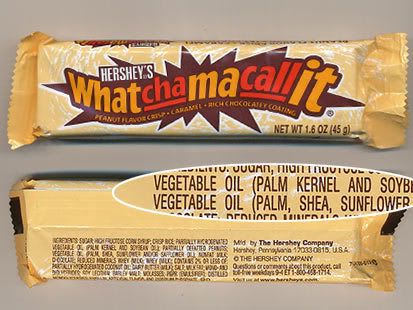
Ingredients for Whatchamacallit bars include palm kernel and soybean oil and may also include sunflower or safflower oil, according to the candy's wrapper.
That defense -- that there are Hershey's products that still contain pure milk chocolate -- isn't enough for Leitner.
"To me, shaving out the cocoa butter in the less-popular products kind of says that if you like Whatchamacallit [candy bars] you're less deserving of quality ingredients than say, someone who likes Reese's cups," she said.
Cocoa Butter
Cocoa butter is fat derived from cocoa beans. Like other commodities, cocoa prices have skyrocketed in recent years. In 2006, one metric ton of African cocoa butter cost less than $4,000. Today, it costs more than $8,100, according to Judy Ganes, the president of J. Ganes Consulting in Katonah, New York.
Ganes, whose company specializes in research on tropical food products, said that a combination of growing global demand for chocolate and problems in cocoa-producing countries -- heavy rains in Indonesia and civil war in the Ivory Coast -- have driven prices to peaks not seen since the 1970s.
"It certainly has hurt manufacturers," Ganes said.
Ingredients: Truth About Food Labels
In the United States, when a so-called chocolate bar doesn't include cocoa butter or includes other oils, it can't actually be labeled chocolate.
"According to the Food and Drug [Administration's] regulations for chocolate, cocoa butter is the required fat for chocolate," said Susan Smith, the spokeswoman for the National Confectioners Association.
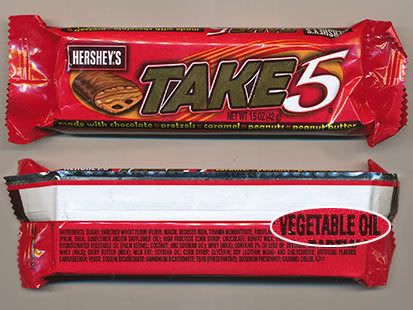
Take 5 used to be Sharon Leitner's favorite candy bar. But the Cincinnati resident says that Take 5's current blend of ingredients -- which, according to the candy's pacakaging, includes "palm, shea, sunflower and/or saffron oil" -- doesn't please her taste buds.
In 2006, there was a challenge posed to this standard and to other standards for U.S. food products. The Grocery Manufacturers Association, the trade group representing the food, beverage and consumer products industry, petitioned the FDA to "modernize" its regulations.
GMA spokesman Brian Kennedy said that the goal of the petition was to accommodate innovation in the food industry.
He said that under current regulations, for instance, if food companies make pasta out of a blend of whole wheat flour and white flour, they can't officially call it "pasta."
Made with Chocolate
A blended product, he said, would probably be more palatable to consumers than 100 percent whole wheat pasta. But if the new product isn't called pasta, he said, people won't buy it.
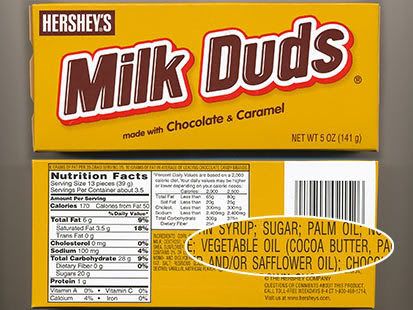
This package of Milk Duds includes the label "made with Chocolate & Caramel." Candy critic Cybele May said that words and phrases such as "made with chocolate," "chocolatey" and "chocolate candy" are sometimes used by candymakers to describe candy that doesn't meet the federal government's standards for chocolate.
"When they want to have pasta, they want to purchase something that actually says pasta," Kennedy said.
But when the GMA petition came to light, it was its implications for chocolate that got attention: An appendix to the petition noted that the changes could allow for manufacturers to use vegetable oils other than cocoa butter to make chocolate.
Both consumers and small chocolatiers decried the proposed changes. In 2007, Mars Inc., the No. 2 chocolate-seller in the U.S. and the maker of M&M's, broke ranks with industry peers and also came out against the petition.
Chocolate Wars
Europe has had its own chocolate wars. In 2000, after years of heated debate, the European Union struck an agreement allowing for chocolate products to contain up to five percent of oils other than cocoa butter.
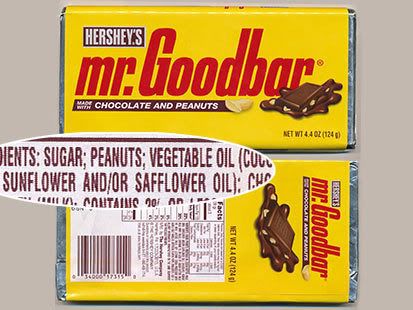
"Mr. Goodbar is made with chocolate but is not a chocolate bar," candy critic Cybele May said. The ingredients list for the bar does include cocoa butter, but it also includes "palm shea, sunflower and/or safflower oil."
To date, the U.S. petition has gone nowhere.
"FDA will complete the review of this petition in context of the Center's priorities," FDA spokesman Mike Herndon said in an e-mail to ABCNews.com.
'Chocolatey' Goodness?
Meanwhile, May said that candymakers can skirt the regulations for what can be labeled chocolate by emblazoning their wrappers with phrases like "chocolatey," "made with chocolate" and "chocolate candy."
Hershey's Kissables, she said, are one example. May, who blogged about Kissables earlier this month, said that when the candy contained cocoa butter, the candy's wrapper included the phrase "milk chocolate." It's since been replaced with "chocolate candy."
On the back of the Kissables wrapper, the vegetable oils used are listed as "palm, shea, sunflower, and/or safflower oil."
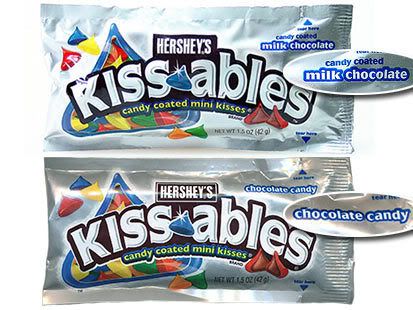
There's a difference between the old Hershey's Kissables wrapper (above, courtesy of Candy Blog) and the new one. Candy critic Cybele May says the new wrapper no longer says "milk chocolate" because the candy's formula has changed.
Such combinations of oils and that "and/or" conjunction can be found on other candy wrappers too. It gives candy companies the flexibility to change which ingredients they use when vegetable oil prices fluctuate, said Barry Swanson, spokesperson for Institute of Food Technologists and a professor of food science at Washington State University.
"If one of those fats or oils becomes very expensive, they'll just use less of it," Swanson said.
"I think anytime we're looking at increased costs, you're going to find more, shall we say, creative formulations to try to reduce the cost involved in producing a product," he said.
Cocoa Substitutes
May said that Hershey's isn't the only company that uses substitutes for cocoa butter. Baby Ruth bars by Nestle -- the third-biggest chocolate-seller in the U.S. -- once contained "real chocolate" but haven't had it for a long time, she said.
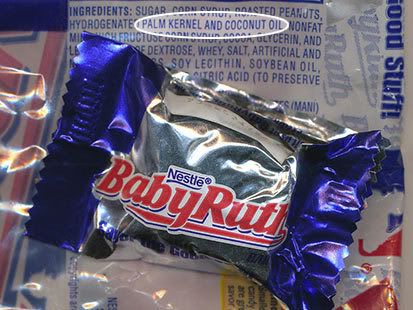
Ingredients for Baby Ruth Miniatures include cocoa but also hydrogenated palm kernel and coconut oil.
Nestle also recently introduced a Mexican bar in the United States called Carlos V. May said that the Mexican version of the bar was made of chocolate, but the American version is not.
Attempts to reach Nestle's Mexican branch were unsuccessful.
Patricia Bowles, the communications manager of Nestle Confections and Snacks for Nestle's U.S. branch, said that the changes to Baby Ruth's ingredients took place before Nestle purchased the brand in the 1990s.
Overall, she said, economic conditions haven't led Nestle to change the formulas for its products.
"We are not quick to change something that we know our consumers love," she said.
Changing ingredients isn't the only way candymakers and other food producers cope with rising food costs; they can also change the sizes of their products and, most noticeably to consumers, they can raise prices. Both Mars and Hershey announced wholesale price increases earlier this month.
Nestle, which also sells bottled water, frozen meals and other food products, has reported its 2008 profits were bolstered by price increases for its goods.
|
If you call it lemonade, it has to have lemon in it. Otherwise, it is just lemon flavored drink. I have been trying to find something that states the requirements for lemonade to be called lemonade, but can't. There is obviously something to define what chocolate is, and now the candy co's are trying to "steal candy from a baby" by taking away their chocolate fix.
I'm never a fan of changing recipes. I think that it is a matter of integrity to the product and brand to stay with it as a matter of longevity testament. Otherwise really you aren't selling the same product, it's a variant, 1.2 version or some other. Recipes change for things all the time based on available product, the challenge is that the consumer isn't supposed to know the difference.
I already don't like American chocolates as much as I prefer European chocolate. Thankfully I can get Euro chocolate here in NYC easily.
what do you think of this story? Can you tell the difference?
__________________
I don't care if you are black, white, purple, green, Chinese, Japanese, Korean, hippie, cop, bum, admin, user, English, Irish, French, Catholic, Protestant, Jewish, Buddhist, Muslim, indian, cowboy, tall, short, fat, skinny, emo, punk, mod, rocker, straight, gay, lesbian, jock, nerd, geek, Democrat, Republican, Libertarian, Independent, driver, pedestrian, or bicyclist, either you're an asshole or you're not.
|